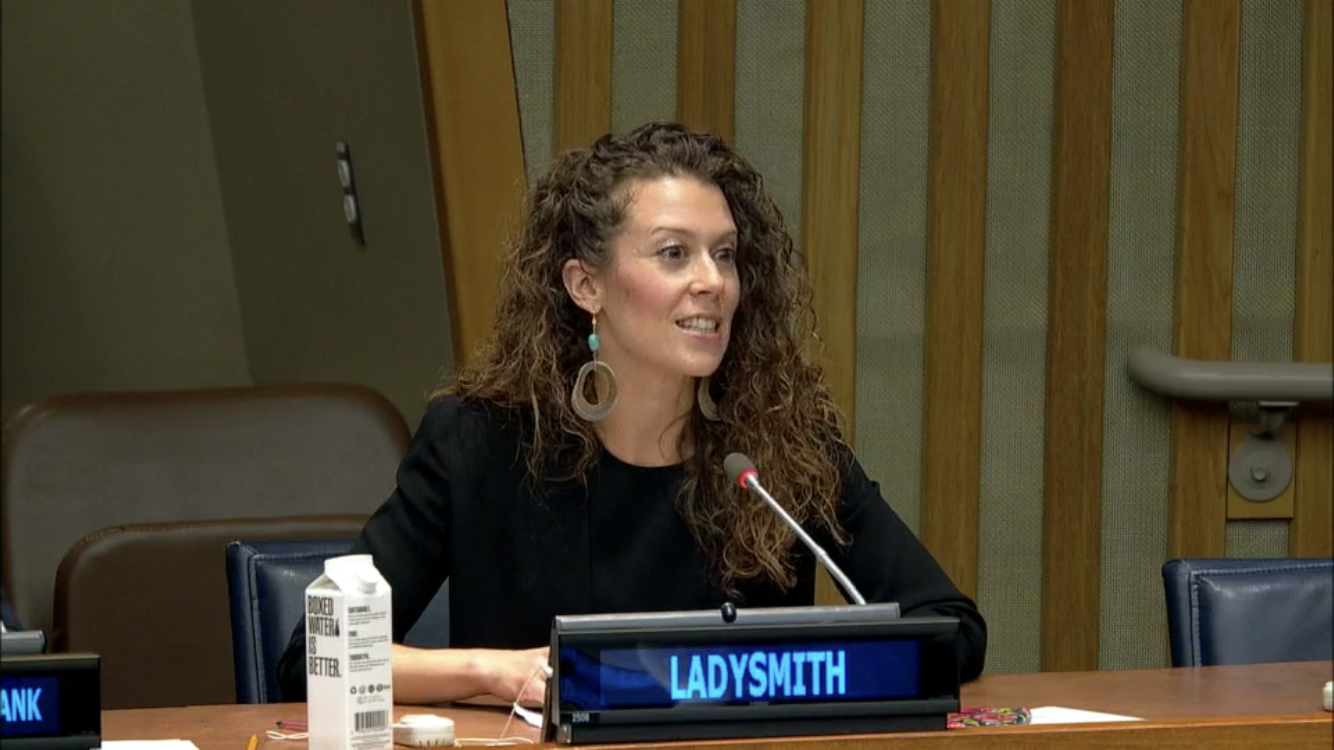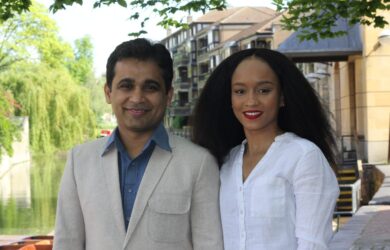
Tara Cookson on her academic research and advocacy for women and how focusing on certain data can obscure what is really happening on the ground
If we just look at metrics about development programmes, they might look good. But we need a different, broader lens and different measurement tools to see the overall impact of programmes.
Tara Cookson
Tara Cookson’s research has always been ahead of the curve when it comes to women and development. Her PhD supervisor, Professor Sarah Radcliffe, called it “highly original”. Since leaving Cambridge Tara has continued to break new ground, founding the feminist research consultancy Ladysmith and taking up a Canada Research Chair in the School of Public Policy and Global Affairs at the University of British Columbia where she is working on a book on the datafication of development work.
Tara, who won the Bill Gates Sr. Prize in 2014 and set up Gates Cambridge’s Learning for Purpose programme, is committed to tackling inequality and empowering women, particularly the most marginalised.
She combines her ongoing on-the-ground work for Ladysmith with pioneering new ways of approaching development issues in her academic role. Her recent work with Ladysmith, for instance, includes a UN Women project on women’s economic empowerment policy. UN Women also commissioned Tara to write a discussion paper on social norms in international development which went on to inform its global strategy. Those norms include everything from ideas about women’s appearance or ideas that lead to child marriage to stereotypes about women’s role in care work – the norms that stop women and girls from realising their full human rights. Another project involves mapping how development workers support informal and formal care work in general in East and Southern Africa.
In her personal life, Tara [2011] has also pursued an unconventional path. While she lives in Vancouver, where her UBC post is, in 2019 she purchased a rural 75-acre farm with her husband, fellow Gates Cambridge Scholar Isaac Holeman. She says the quiet location is a draw for friends and colleagues who need to finish projects or books and that she has got very into growing and canning vegetables. Their experiment in stewardship of a small farm has also helped both of them to explore work projects related to rural development. For example, Tara is pursuing an ethnographic study in communities near her farm, focused on elder care and economic development in rural Canada. Isaac, meanwhile, is working on a start-up called Croft, which is building hydrogen-powered trucks and equipment with the aim of making the transition to clean energy work for rural communities. Tara and Isaac are continually experimenting with different ideas about regenerative agriculture, and growing more of their own food has been a grounding complement to their intellectual pursuits.
Early years
Tara’s academic life has come full circle since she did her undergraduate degree in International Relations at the University of British Columbia in Kelowna, where she grew up. The course and her travels during her undergraduate years fed a keen interest in global affairs and social justice. After a gap year in Brazil during her degree, Tara returned to Kelowna where she worked for the Women’s Resource Centre, eventually becoming a board member. The Centre provided needed services and advocacy for women in the community.
On graduating, she worked as a project director for the international NGO Acorn in Argentina, which worked with low-income communities. That work inspired her to do her master’s at the University of Toronto, focusing on transnational women’s organising and care policies. Her master’s thesis was on care work in Venezuela under the Hugo Chavez regime and on the impact of a policy to pay low-income housewives a stipend for their caring labour.
Cambridge
Following her master’s, Tara travelled through Central America and Eastern Europe and it was then that she was accepted to Cambridge University to work with Professor Radcliffe on a Gates Cambridge Scholarship. Her PhD in Geography focused on the impact of conditional cash transfer (CCT) programmes on mothers in Peru.
Tara finished her studies in 2015 and started working on consulting projects and on her book – Unjust Conditions, based on her PhD. The book subsequently won two awards and an honourable mention, and led to an invitation for Tara to testify on the gendered impacts of conditional cash transfers at the United Nations 63rd Commission on the Status of Women.
She was soon offered a job at a US-based consulting company, but it didn’t involve gender equality. “I realised that I either had to start a company focused on what I thought needed to be done on gender equality – which no-one else was doing – or take that job which was not really about tackling the problems that motivated me. I decided to take the riskier route and started Ladysmith in 2016,” she says.
In 2017, Tara met up with a mentor from her PhD days, Professor Jasmine Gideon, at a conference. She put Tara back in touch with her own recently graduated PhD student who was working on gender-based violence. They got on the phone, and Tara asked if she wanted to “hustle” with her to grow Ladysmith. Within 10 minutes of the call, the student – Lorena Fuentes – had emailed her bio and cv. She became one of Ladysmith’s co-founders. Slowly, the two women built up a client base of organisations like UN Women, Unicef, Facebook and the Hewlett Foundation, and became known as thought leaders in the space of gender equality. Now they have a small team of researchers that work for them on projects around the world.
In 2020 Tara was working flat out on Ladysmith, covering a broad range of projects on subjects ranging from food security to social protection. She found she was missing academia and felt the need to do original research which could offer new approaches to new problems. A professorship and Canada research chair came up in the School of Public Policy and Global Affairs at the University of British Columbia. It was too good an opportunity to pass up and has meant that Tara has been able to work with leading thinkers across different social issues and have a lot of time for research on gender, development, and global public policy. Lorena took over the day to day running of Ladysmith as its Director, although Tara continues to serve as a co-founder through providing strategic advice and working on one or two projects a year.
At UBC Tara has been working on a book project on data on gender and development and how data is changing feminist practice – a book she is co-authoring with Lorena. It includes a case study of the Cosas de Mujeres programme that they ran for two years at the Colombia-Venezuela border, which used WhatsApp to connect marginalised women with support services in relation to gender-based violence.
For the book, Tara’s research team interviewed over 100 development practitioners and rights advocates about how data is changing the way they work. She says: “Data can be a tool for feminist change, but it is not the only tool needed. It is important to recognise its limitations, when it should not be collected and what the unintended consequences might be of collecting it.”
The book’s theme harks back in some part to Tara’s experience of doing her PhD. She says: “If we just look at metrics about development programmes, such as how many children go to health clinics as a result of conditional cash transfers, they might look good. But if we peel off another layer and consider the time mothers take to meet the conditions for cash transfers, there is a cost. And if we just consider how many children go to school, we may miss the fact that the quality of education they receive due to teacher shortages is not good. The metrics you choose to measure really matter. That’s why I started Ladysmith. We needed a different, broader lens and different measurement tools to see the overall impact of programmes.”
*Photo of Tara at a UN Women conference at the United Nations in 2020.












